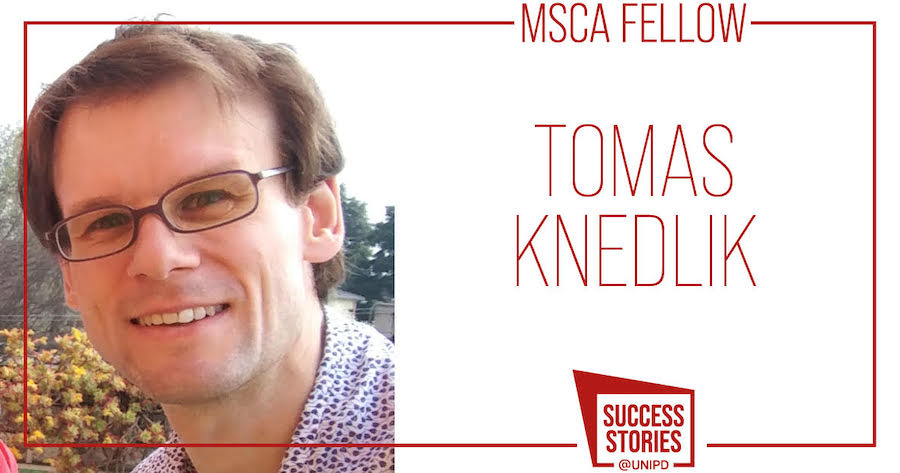
MSCA Fellow: Tomáš Knedlík
Look small, find large: from cellular biology to neurodegenerative diseases

Tomáš Knedlík works on mitochondria and their communication with other cell organelles. It is important to study mitochondria and their contacts because their dysfunction may lead to quite a number of disorders, such as Parkinson’s and Alzheimers’ diseases.
Tomáš obtained his PhD at the Institute of Organic Chemistry and Biochemistry in Prague, Czechia, and in 2019 he came to the University of Padua to work with Professor Giacomello at the Department of Biology. In 2020 he received a MSCA Individual Fellowship to support his project here.
Can you tell us in brief what your MSCA IF research project is about? Who will benefit from it?
My project MERCURY investigates the contact sites between mitochondria and endoplasmic reticulum (MERCs). They regulate various physiological cell processes, such as calcium and lipid metabolism, and their dysfunction is associated with several disorders, including Parkinson’s and Alzheimer’s diseases. The precise molecular structure and regulating mechanisms of MERCs are not fully understood and well-described. Therefore, in my project, I am investigating the modulation of the contact sites by small molecules. Using a special microscopy technique, called high-content phenotypic screening, I am identifying bioactive compounds that regulate the function and/or structure of the MERCs. Additionally, I will identify the proteins located within the contact sites that bind the identified bioactive molecules.
You obtained your PhD in Prague – Czech Republic, where you also worked one year as a postdoc; why did you decide to come to Padua? And how did you choose your supervisor, Marta Giacomello?
I did my PhD at the Institute of Organic Chemistry and Biochemistry in Prague, Czechia. My projects contained a lot of protein (bio)chemistry, protein targeting and a little bit of cancer biology. As a result, I co-developed polymer-based antibody mimetics (iBodies) that recognize their target proteins by the inhibitors attached to the polymer backbone. For my postdoc stay, I wanted to try a different field and to work on a more biological project. Therefore, I moved to Padova and joined the lab of Marta Giacomello to study the inter-organelle communication and to learn new methods in cell biology. Moreover, I was searching for a position in a nice medium-size city, so Padova was the perfect match!
You attended the MSCA Marathon at UNIPD before submitting your application. Do you think it was relevant for your success in the call? What are the key suggestions/hints/ideas that helped you writing a successful proposal?
The Marathon at Unipd was important for receiving the MSCA fellowship; I would say it might have been even impossible to get it without the course. In general, I guess researchers are somehow capable of writing the scientific part of their proposal, but I find it quite difficult to describe well the other “chapters” of the application, such as impact and implementation, with no help. The crucial idea I got during the Marathon was to start to think as a MSCA evaluator, not as a researcher.
What are the best and most difficult aspects of a MSCA application?
The best (but also the most difficult) part of the application is its complexity – I needed to think not only about the scientific part of my project, but also about its communication to the scientific community and public, as well as its impact on my career. The aim of the European Commission is to support researchers in their career development, so I paid extra attention to describe in detail how the project will improve my skills and future career prospects. Just by writing and submitting the application, I learnt new skills and learnt to think about the project (and science in general) in a more complex way.
Have the current COVID 19 pandemic affected your research? How?
Well, my research was affected by COVID just the same way as everybody else’s. Last year [2020] I could not come to the lab to work for almost two months. There were no conferences to visit. Now it seems there are some problems and delays with supply of lab material and chemicals. COVID has also complicated our personal life, since the travelling back to Czechia is now much more difficult and full of obstacles. But I do not want to complain, because my family has stayed healthy and we have not suffered from a potential job loss, which is definitely a most important issue.
If you wish to learn more about Tomas’ research, do not miss his video: https://youtu.be/frvxLGJKffc
International Research Office
via Martiri della libertà 8, 35137 Padova, Italy
tel. +39 049.827 1947 / 1948 / 1945
fax +39 049.827 1911
international.research@unipd.it


